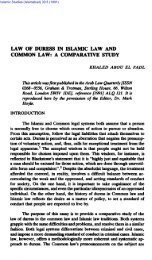THE ECONOMIC DILEMMA OF THE MUSLIM WORLD
THE ECONOMIC DILEMMA OF THE MUSLIM WORLD
THE ECONOMIC DILEMMA OF THE MUSLIM WORLD
Create successful ePaper yourself
Turn your PDF publications into a flip-book with our unique Google optimized e-Paper software.
Islamic Studies 35:3 (1 996) 299<br />
the Indian specialist, the experiment reverted to the traditional methods as soon<br />
as the foreign experts left.<br />
What concerns us in this experiment is that it moved along on the basis<br />
of the equation specific to the loreign experts supervising it, and went back to<br />
operate according to another equation - the equation of the lndian society -<br />
the moment these foreign experts left.<br />
This phenomenon recurs, in one form or another, in all fields of<br />
activity, even the scientific, as an Algerian engineer brother preparing his thesis<br />
for doctorate in Europe, mentioned to me. Since there was an ideological<br />
affinity between us and we had previously discussed the above sub-ject, he<br />
wished to recall for me his personal experience in the laboratory. He observed<br />
that despite his superiority over his colleagues from a theoretical standpoint, on<br />
the practical side, that is to say, from the standpoint of utilising the tools of<br />
practical experiment, he suffered from a certain lack of confidence in these<br />
tools. Hence his complex or inhibition hampered the result or results which his<br />
mind had grasped before others'.<br />
Despite the apparent difference between the two fields, this story is akin<br />
to the one recalled by the Indian specialist. The two differ only in form - this<br />
as an experiment in a li~boratory of plastic material and that in the field of<br />
electronics applied in agriculture. However, they do not differ in their social-<br />
psychological origin, as each story indicates that the formation of both the Indian<br />
and the Algerian experts did not idlow them full control over their scientific<br />
tools, whereas the level of their theoretical knowledge - at least in the case of<br />
the Algerian expert - appeared very high. What struck me in the Algerian<br />
expert as he narrated his story, itnd it is worth mentioning, was that he seemed<br />
to be fully conscious 01' the complex which afflicted him as someone living<br />
through an ordeal.<br />
In any case, each of the two stories implies that scientific technique also<br />
demands a social cqui~tion. The latter is not created spontaneously in the<br />
amphitheatres of universities. It is society itself that bestows it on the individual<br />
amidst habits and traditions on which a child is nurtured from its cradle. It is<br />
denied to a child born in another society where social equation has not been<br />
formed, or has been lost due to definite historical-social causes, as is the case<br />
with the Muslim society today.<br />
Broaching the question of the manner of its formation, we find that<br />
social equation is formed in two ways. It may be wrought by time, with a<br />
recurrence of experiments which are gradually transformed into firmly<br />
established habits, automatically stamping individual and collective behaviour<br />
with the seal of efficacy. Or, it may be formed under the compulsion of a<br />
purposeful will which intends what it does and docs what it intends, in order to<br />
face harsh conditions and imperatives.<br />
There is no doubt [hi11 Western society enjoys a social equation<br />
gradually formulated by time over the centurics and perfected, a1 times, by new<br />
ideas like those of Taylor in thc last century.
















